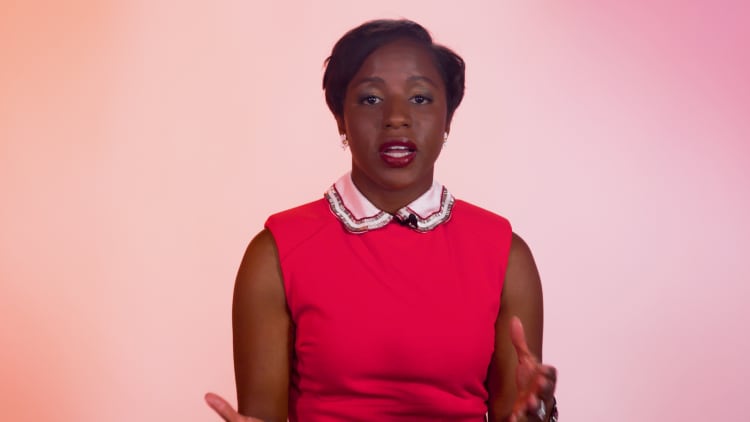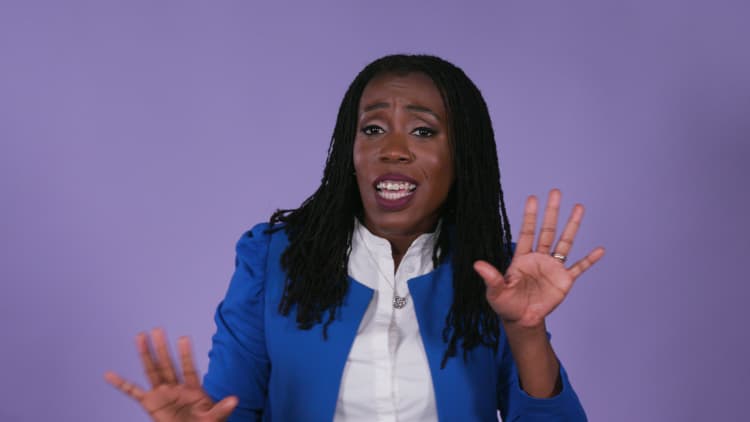When setting New Year's money resolutions, a majority of Americans (61%) say they plan to pay off debt in 2020.
That's according to SoFi's 2019 Year in Review, in which the online personal finance company polled more than 2,000 SoFi members and non-members to see how they fared financially in 2019.
In addition to getting out of debt, which was the No. 1 goal cited by participants, 31% of respondents say they want to max out their retirement accounts in 2020, followed by 22% who aim to negotiate a raise and 23% who want to start investing.
Eliminating debt might be easier said than done, however. Just 18% of SoFi members (and 19% of non-members) were able to get out of debt in 2019, according to SoFi's review.
Despite the fairly low number of survey participants who managed to become debt-free last year, it's still a worthwhile — and achievable — goal to work toward in 2020. These three tips from money experts can help you make strides toward eliminating your debt this year.
1. Consider refinancing
If you're paying back loans, such as a mortgage or student debt, refinancing is an option. When you refinance your loan, you're given a new loan with more favorable terms, often a lower interest rate.
But before refinancing your loans, start by shopping for the best terms for the type of loan you need, says Douglas Boneparth, president and founder of Bone Fide Wealth. This can be done online or by visiting local banks and credit unions.
As of December 2019, the average rate on a 30-year fixed-rate mortgage is 3.9%, according to Bankrate. But keep in mind the upfront costs you'll owe if you decide to refinance, which typically include a mortgage application fee, an appraisal fee and an origination fee. In total, you can expect to pay between 1% and 2% of your total mortgage balance.

Given how expensive it can be to refinance, it's smart to calculate your "break-even point," which is the point in time where the costs of refinancing are equal to the savings. Your lender should be able to run this calculation for you, or you can do it yourself using a mortgage refinance calculator, such as this one from Bankrate.
Next, consider whether or not your break-even point is too far away to be worth it. With mortgages, if you think you'll have moved out of the home you're paying on before you reach your break-even point, it's probably not worth it to refinance.
In order to qualify for refinancing, you must first apply via a refinance lender who will determine if you're a trusted borrower. Whether you're approved depends on a number of factors that are ultimately up to the lender, but can include things like your credit score and proof of a steady income.
With student loans, refinancing can be helpful since doing so often means consolidating multiple loans into one at a lower interest rate with lower monthly payments. You can try out this student loan refinance calculator from Nerdwallet to see if it makes sense for you.
However, it's typically not advised that you refinance student loans if you want to qualify for federal forgiveness programs, which can help pay of your student loan debt, or if you want to establish a repayment plan based on your income.
2. Set up your 2020 repayment strategy
To streamline your journey toward becoming debt-free, it's smart to set up a strategic repayment plan.
One popular approach to debt is the "snowball method," which involves paying off your debts in order from the smallest amount to the largest. This option is often favored by those who need a confidence boost at the start of their debt journey since it allows you to completely eliminate whole portions of debt right away.
Or you could go with the "avalanche debt method," which involves listing your debts from highest to lowest by interest rate. With this repayment strategy, you pay the minimum balance on each of your bills, then dedicate as much extra as you can each month to the one with the highest interest rate.

Either way, a good place to start is by recording all of your debts in one place. This can be done on a physical sheet of paper or within an Excel spreadsheet. The first step is to write down each bill or loan that you currently owe. Then, next to each one, list relevant information, including its due date, to whom it's owed and its interest rate.
Once everything you owe is written down and organized in one place, you can begin to prioritize how and where your money will go in 2020, rather than haphazardly pay back debt without a strategy to guide you.
3. Remain calm and celebrate your successes
Financial experts (and those who have embarked on their own debt journeys) will often tell you that a big part of paying off debt is having the right mindset.
While some people believe the secret to becoming debt-free means leaning into the inevitable sense of urgency that often comes with owing a lot of money, others will say you should get mad at your debt. Boneparth takes a different outlook: "Try to be unemotional about it," he says. "Debt is not emotional about you."
Instead of panicking about the amount you owe, calmly set up an actionable plan for how you'll pay all of your bills.
You should also celebrate your successes along the way, says Ryan Marshall, a New Jersey-based certified financial planner. It helps you stay motivated to keep going.
Milestones, such as paying off half your debt or an entire student loan, should be recognized, he says: "I think everyone needs to live and enjoy life. The celebration of success helps drive you forward toward your future goals."
Like this story? Subscribe to CNBC Make It on YouTube!
Don't miss: You could save hundreds of dollars per month by refinancing your home—here's how to do it



